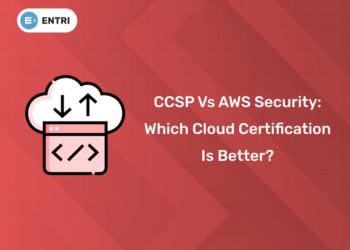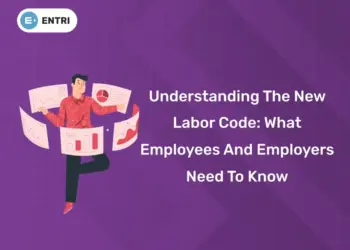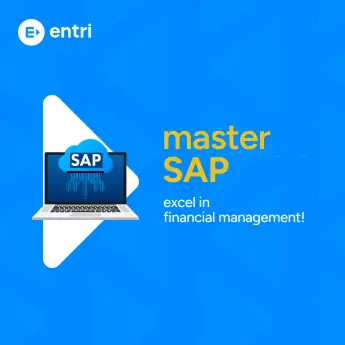Table of Contents
This is a challenging question, and it is challenging to describe how to choose the right SAP module for your career that can be learned, or which SAP module is the best to study. The SAP certification is widely acknowledged as the most valuable of all professional certificates, and it has demonstrated its value to thousands of SAP consultants who are currently working in different parts of the world.
Check out this video by Entri in Malayalam!
There are modules in SAP that are both functional and technical, and there are a few that combine the two types of modules. Invest some time in determining which one you find appealing and believe you would be interested in learning, then check to see which module is in demand, and last, make a choice.
Join Entri’s SAP FICO Training Course today!!
Introduction to SAP and SAP modules
The acronym SAP refers to the Systems Analysis and Products company, which was established in June 1972. Since its debut, a number of SAP ERP operations modules have been made available. These modules are intended to concentrate on a variety of activities, including SAP ERP Sales and Service, Customer Relationship, Sales and Distribution, Financial Management, Business Intelligence, and a great deal more.
It is a massive SAP. In a variety of businesses, it serves a wide range of functions and themes simultaneously. The most important thing is that you choose a SAP module that is appropriate for your abilities. In addition to assisting you in acquiring SAP knowledge more quickly, it will also be of great assistance to you in your professional life.
Which SAP module would you choose, and how would you go about doing so? Which of the SAP modules appeals to you the most? The following are three essential aspects that you want to take into consideration while selecting the SAP module for training and certification opportunities.
Important factors that you should consider before choosing the SAP module:
Before applying for the SAP course, take a moment and go through the elements that can assist you in choosing the right SAP program for you. Have a look.
1. Available SAP modules
There are 160 certifications available for various SAP profiles, and many of the modules are utilized extensively by businesses that are reliant on SAP for their commercial success.
To acquire the desired certification straightforwardly and efficiently, there are SAP certification courses that facilitate this process.
2. The Career Goal
Although this is a fundamental consideration in choosing the module of choice, it is frequently the one that gets disregarded the most. Before deciding on a particular SAP module, it is necessary to determine whether one’s interests, capabilities, and professional aspirations are aligned with the completion of the SAP course with the necessary level of commitment, and also with the work environment in question.
3. Educational Background
The examination of one’s educational history and professional experience constitutes the third step in the process of becoming a certified SAP professional employee. As a result of the fact that the existing SAP modules are domain-specific, it is necessary to select the module that corresponds to the requested domain. At some point, it will be necessary to inquire about things like “What is your domain?” The question “What experience are you having in your domain?” is intended to facilitate the selection of the desired SAP course in an easy manner.
When it comes to choosing the SAP module for a vocation, the educational background of the professional is a major factor to consider. The educational background makes it simpler for a professional to comprehend business procedures and other relevant characteristics that are included in the area. These are the kinds of things that have been learnt during the academic acquisition of information a professional possesses. Through the utilization of enterprise jargon, the professional will be able to explain concepts in the same business language as the users of the industry.
Maintaining the same communication frequency throughout project conversations is a challenging endeavor for both business and consultant users who do not share the same enterprise backgrounds. In addition, it is difficult for members of such a diverse team to comprehend and acquire a grasp of the process, which can even consume an excessive amount of time. Consequently, the educational component is of the utmost significance when it comes to choosing of a SAP module.
Every facet of the industry can be accommodated by SAP’s many different modules. As a result of a lack of domain expertise and insufficient experience, the process understanding between SAP end users and SAP consultants sometimes becomes confusing and time-consuming. As a result, the educational component is a crucial component in determining how to select the SAP module. Let’s have a look at the different SAP modules and the career pathways that are related with different SAP modules. The following is a list of some of the most widely used SAP modules from various companies:
Join Entri’s SAP FICO Training Course today!!
Professional experience or educational background needed for the relevant SAP ERP module
| SAP ERP Component | Business Process Knowledge, Educational Background or Professional Experience |
|---|---|
| FI | Accounts |
| CO | Finance |
| MM | Procurement, logistics or supply chain management (SCM) |
| SD | Sales and marketing |
| PP | Production and operations management, an Engineering degree in any discipline |
| PM | Maintenance management, Engineering degree in any discipline |
| QM | Logistics or supply chain management (SCM) |
| PS | Project management, including PMP certification |
| HCM | Human resources management |
| BASIS | Computer science or computer engineering |
| ABAP | Computer science or computer engineering |
SAP Finance (FI):
Management of an organization’s finances can be improved with the assistance of SAP Financial Accounting. Due to the fact that finances are an essential component of every organization, it is essential to have proper administration. When a human being is responsible for managing the entire financial accounting process, it can become stressful and irritating. If you are an individual who has a background in commerce or finance and has a minimum of six months of expertise in the domain, then SAP Finance is the appropriate module for you to use.
CAs, CIMAs (Chartered Institute of Management Accountants), ACCAs (Association of Chartered Certified Accountants), CPAs (Certified Public Accountants), CFAs (Chartered Financial Analysts), and CMAs (Chartered Management Accountants) are all eligible to receive instruction in the SAP Financial Module.
SAP Material Management (MM):
SAP Material Management encompasses a variety of corporate tasks, including purchasing and inventory management, as well as procurement and purchasing. The purchase may be for the acquisition of commodities or services, and it may involve either domestic or international imports (foreign procurement). Almost all of the manufacturing and delivery companies that are considered to be major adopt SAP using the SAP MM module. The first and most important step in becoming a skilled SAP MM Professional is to have an understanding of the business processes that are operational in the material management domain.
SAP Sales & Distribution (SD):
Inquiry, quote, sales order administration, credit and debit notes, and related business tasks are all included in the scope of SAP Sales & Distribution application. In addition to that, it encompasses the management of rebates and the selling of exports. If your primary areas of study are marketing, sales and distribution tactics, and channel management, then the SAP SD module is the most suitable option for you. There are a significant number of enterprises all over the world that have used the SAP SD module.
SAP Production & Planning (PP):
All aspects of production are covered by SAP Production & Planning, including the amount of time it takes to set up a machine, the amount of time it takes to manufacture a product, and the number of labor hours that are consumed in the process of generating a product. Wastage, scrap, by-products, and co-products are all examples of things that fall under the purview of the packaging component. A significant component of SAP is known as SAP PP. In addition to keeping a record of the flow of the manufacturing process, it also keeps track of the projected and actual expenses. A potential candidate must possess business expertise in the field of manufacturing and supply chain planning.
Plant Maintenance (PM):
It is possible to do preventative maintenance, predictive maintenance, and shutdown maintenance with SAP Plant Maintenance solutions. The PM component gives businesses the ability to keep their production facilities in the best possible shape by doing maintenance at the appropriate intervals. The user is able to do maintenance on the equipment and create production schedules that are more efficient with the help of this module. Both plant-based and cross-plant maintenance planning can be accomplished with the help of this all-encompassing software solution, which is provided to organizations. In the event that you have a minimum of six months of experience in plant operation, maintenance, and services, then SAP Plant Maintenance is the appropriate SAP module for you to utilize.
Project System (PS):
The Work Breakdown Structure (WBS), Network, milestones, and confirmation on the status of the project that has been completed are all included in the SAP Project System module, which covers business activities that are necessary for effectively managing projects of any given size. The SAP Project Systems (PS) module is a technological component that incorporates project management capabilities. Project management methods are utilized by organizations in order to put various concepts into action. An organization is given the capacity to acquire insight into projects, promote transparency, and improve accountability through the utilization of the PS module. In order to participate in the SAP PS module, you are required to have prior expertise in project management and execution, in addition to having a fundamental understanding of the procedures involved in accounting and logistics.
Join Entri’s SAP FICO Training Course today!!
Human Capital Management (HCM):
The SAP Human Capital Management module provides a comprehensive and integrated collection of solutions that can assist you in efficiently managing your employees. This allows you to dramatically improve the performance of your staff, improve the accuracy of your planning, streamline your human capital management operations, reduce operational expenses, and boost your margins with relevant talent information. SAP HCM allows you to automate your core HR processes. If your understanding of business processes in the field of Human Resources and Organization Management is extensive and you are proficient in this area, then SAP Human Capital Management is the ideal SAP module for you to use.
Advanced Business Application Programming(ABAP):
ABAP is a high-level programming language that was developed by SAP and is of the fourth generation. The term “Advanced Business Application Programming” is referred to by this abbreviation. The reason for this is that it is the language that is now being utilized to develop the SAP Application Server. SAP’s NetWeaver platform includes the SAP Application Server, which is a component that is utilized for the development of business applications. Before beginning training for ABAP certification, you do not necessarily need to have any prior work or domain expertise. This is likely the best aspect of the certification. Programming and analytical skills, together with a solid grasp of database and object-oriented programming concepts, are required.
If you work as a SAP consultant for a consulting firm, you will have a good number of possibilities to travel, meet new clients, implement SAP ERP projects for a variety of sectors, and learn new features and functionality of SAP ERP with each new version with each new release. This means that your career graph will exponentially increase with each new project or implementation, and your remuneration will also increase at the same rate.
Master SAP with Expert-Led Courses
Unlock your potential with our comprehensive SAP courses! Learn essential modules like SAP MM (Materials Management), SAP SD (Sales and Distribution), and SAP FICO (Financial Accounting and Controlling) from industry experts.
Know MoreConclusion
Those individuals who have clearly articulated professional objectives have been presented with a wealth of opportunities by SAP. However, before applying to any SAP module, it is recommended to take some time to consider the reasons why one would want to go for a specific module. This should be done before applying to any SAP module. Is the module necessary for short-term work, or is it necessary for a long-term career? It is necessary to have a definitive response to this question.
The candidate will be able to select the appropriate SAP module and begin a gratifying journey toward becoming an SAP expert once they have sorted through the selection considerations and determined which ones are most important. The online practice exam for SAP that is offered by Entri is of great assistance in bringing you to the point in your professional life that you had envisioned for yourself. During the period that the candidate chooses, they are obligated to provide the candidate with the required quantity of in-depth information, as well as hands-on experience that is based on the actual application of SAP modules.
Master SAP with Expert-Led Courses
Unlock your potential with our comprehensive SAP courses! Learn essential modules like SAP MM (Materials Management), SAP SD (Sales and Distribution), and SAP FICO (Financial Accounting and Controlling) from industry experts.
Know MoreFrequently Asked Questions
Q) What is SAP FICO, and how does it differ from SAP MM?
SAP FICO focuses on financial accounting and controlling, and managing financial transactions, while SAP MM deals with material management, procurement, and inventory processes.
Q) Which business processes does SAP FICO cover?
SAP FICO covers a range of financial processes, including general ledger accounting, accounts payable, accounts receivable, asset accounting, and cost accounting.
Q) What functionalities does SAP MM offer in terms of material management?
SAP MM handles procurement processes, inventory management, material valuation, vendor evaluation, and invoice verification.
Q) How do SAP FICO and SAP MM integrate with other SAP modules?
Both modules integrate seamlessly with other SAP modules like Sales and Distribution (SD), Production Planning (PP), and Warehouse Management (WM) to ensure end-to-end business process integration.
Q) What are the typical job roles associated with SAP FICO?
Job roles for SAP FICO professionals include SAP FICO Consultant, Financial Analyst, SAP FICO Manager, and Finance Controller.
Q) Which industries commonly use SAP FICO, and why?
SAP FICO is widely used in industries such as finance, manufacturing, retail, and healthcare due to its robust financial management and reporting capabilities.
Q) In what ways does SAP MM contribute to efficient supply chain management?
SAP MM streamlines procurement processes, optimizes inventory levels, and enhances vendor relationships, contributing to a more efficient and responsive supply chain.
Q) What skills are essential for a career in SAP FICO?
Proficiency in financial accounting principles, knowledge of SAP FICO configuration, and strong analytical skills are crucial for a successful career in SAP FICO.
Q) How does SAP MM support cost control in organizations?
By optimizing procurement processes, SAP MM helps control costs through better vendor negotiations, improved inventory management, and streamlined invoice verification.
Q) Which factors should one consider when choosing between SAP FICO and SAP MM for a career path?
Consider your interest in finance or material management, career goals, and the specific needs of the industries you aspire to work in when choosing between SAP FICO and SAP MM.










